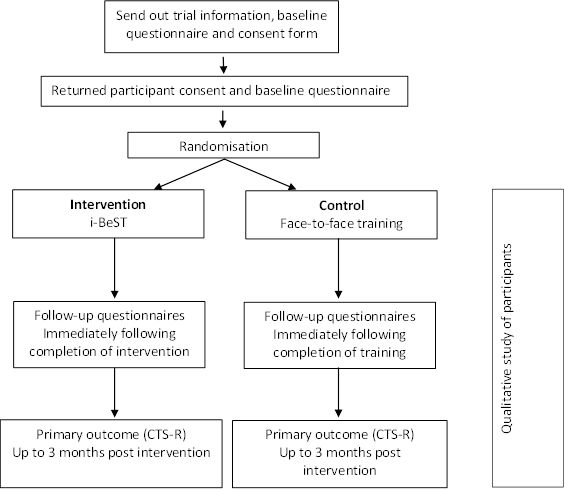Phase Three
Mixed methods evaluation of two implementation strategies for the BeST intervention
Summary
A mixed methods evaluation of two implementation strategies: an online strategy using i-BeST to train physiotherapists, and a traditional face-to-face strategy. This evaluation consisted of a pragmatic multicentre randomised controlled trial (RCT) to evaluate the effectiveness of i-BeST compared to face-to-face training and a qualitative interview study to determine to acceptability of an online training implementation strategy.
Thirty-six physiotherapists were randomised to receive either a face-to-face training workshop or the online training course (i-BeST), designed to provide them with the knowledge and skills to deliver a cognitive behavioural based intervention for low back pain (BeST). ISRCTN82203145
Aims
1: To determine the comparative effectiveness of an online training implementation strategy compared to a traditional face-to-face implementation strategy among physiotherapists for the complex intervention, BeST.
2: To explore the acceptability of training physiotherapists to deliver the BeST intervention with the online programme i-BeST.
Objectives
The objectives of the study were:
- To identify and use a range of outcome measures suitable for evaluating the comparative effectiveness of i-BeST as a training resource for physiotherapists.
- To establish the interest in and uptake of the training interventions from an identified population (physiotherapists in the NHS); determine compliance with both training modalities and participant dropout rate.
- To determine satisfaction with either method of training.
- To evaluate the number of participants implementing the BeST intervention from each implementation strategy.
- To explore participants’ experiences with the online training programme i-BeST.
- To understand participants’ thoughts on receiving training in the BeST intervention with this online modality.
- To learn how i-BeST could be improved for potential future iterations.
Flow diagram of participants through the study

Progress
Both the quantitative RCT and qualitative interview study have been completed and the data is currently being analysed.
0 page comments
